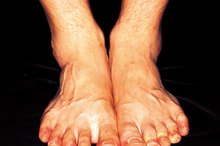Taking Potassium & Water Pills at the Same Time
Potassium aids various functions of your body, including the heart, kidneys, digestive system, muscles and nerves. You usually can get adequate potassium levels from the foods you eat, but you may need more potassium when taking certain medications or supplements, such as water pills, also called diuretics. Water pills remove potassium from your body, so taking supplements at the same time prevents potassium deficiencies. Check with your doctor for advice on replenishing low potassium levels.
Prescription Water Pills
Doctors may prescribe water pills to help lower blood pressure. Diuretics eliminate sodium through water in urine to reduce blood volume and decrease pressure on your artery walls. Water pills also help patients with glaucoma, an eye disorder caused by high pressure on the eyeball, and edema, an abnormal swelling in the body from a buildup of fluid in the tissue cells.
Potassium Deficiency
Nutritional Problems If You Use Digoxin & Furosemide
Learn More
Symptoms of low potassium levels include weakness, fatigue, muscle cramps, constipation or heart rhythm problems. Doctors may prescribe diuretics that don’t reduce potassium, including spironolactone, eplerenone and triamterene, notes Dr. Sheldon G. Sheps of MayoClinic.com. Other medications to lower blood pressure include ACE inhibitors and receptor blockers.
Returning Levels to Normal
Healthy adults normally need about 2,000 milligrams of potassium each day through diet or from supplements, Drugs.com notes. A simple blood test ordered by your doctor or health care provider determines the levels of potassium in your body. Increasing potassium in your diet helps return potassium levels to normal, but supplements may replenish your body with the mineral rapidly if your potassium levels are very low. Supplemental potassium comes in a variety of forms, including oral liquid, powder, tablets, effervescent tablets, extended-release capsules and long-acting extended-release tablets. Potassium plays an important role in keeping fluids and minerals balanced in your body. The symptoms of potassium deficiency warn you about the need to increase mineral levels.
Dietary Recommendations
Does Potassium Aid in Weight Loss?
Learn More
People with high blood pressure may need more potassium in their diets, but patients with other health conditions, such as kidney problems, may need to limit their potassium intake. Health professionals can help personalize your dietary recommendations. Fruits high in potassium include papaya, prune juice, cantaloupe, bananas, raisins, mangoes, oranges and pears. Potassium-rich vegetables include tomatoes, sweet potatoes, avocados, potatoes, asparagus, mushrooms and brussels sprouts. Protein foods, such as lean beef, salmon, yogurt, milk, peanut butter and sunflower seeds, contain high amounts of potassium.
Related Articles
References
Writer Bio
Jerry Shaw writes for Spice Marketing and LinkBlaze Marketing. His articles have appeared in Gannett and American Media Inc. publications. He is the author of "The Complete Guide to Trust and Estate Management" from Atlantic Publishing.









